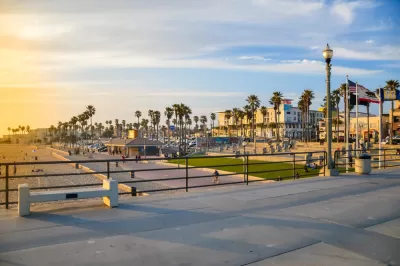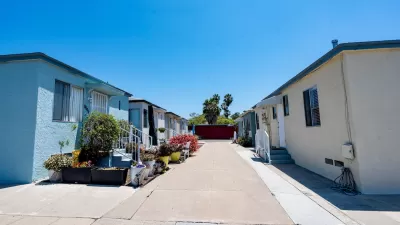The Orange County beachfront community has had enough of the California State Legislature’s preemption of local zoning laws.

The newest front in the battle over local control in California can be found in Huntington Beach, Orange County, where city officials have stopped permitting accessory dwelling units and are considering a legal challenge against state-mandated residential density.
Huntington Beach is a relatively conservative city in a state famous, whether fairly or not, for liberal politics. Huntington Beach attracted attention during the height of the pandemic in late fall 2020, with large protests of the state’s stay-at-home orders and curfew. The protests and adjacent episodes earned the city the nickname ‘Angrytown, USA’ from the Los Angeles Times.
Fast forward to the city’s most recent election, in November 2022, when voters elected a strongly conservative city council majority. According to an article by Jill Replogle for LAist, “The new council promptly vowed to fight state laws and mandates that overrule city zoning rules and would force it to allow more dense housing developments.”
According to Replogle, the Huntington Beach City Council will vote soon whether or not to mount a legal challenge to SB 9 and SB 10, two statewide housing laws approved in 2021, intended to spur housing production by loosening local zoning controls. Four cities located to the north in Los Angeles County—Redondo Beach, Torrance, Carson, and Whittier—announced a similar lawsuit to challenge SB 9 in April 2022.
“Huntington Beach is already considering adopting a rule that would exempt it from the state ‘builder's remedy,’ which allows developers to bypass local zoning if a city lacks an approved housing plan,” reports Replogle.
The City Council voted at the same meeting on February 21 to cease permitting of accessory dwelling units—residential developments allowed by several rounds of state law, including laws approved by the State Legislature in 2019 and 2016.
FULL STORY: Huntington Beach Wants To Take On California Over Duplexes, ADUs

Planetizen Federal Action Tracker
A weekly monitor of how Trump’s orders and actions are impacting planners and planning in America.

Restaurant Patios Were a Pandemic Win — Why Were They so Hard to Keep?
Social distancing requirements and changes in travel patterns prompted cities to pilot new uses for street and sidewalk space. Then it got complicated.

Map: Where Senate Republicans Want to Sell Your Public Lands
For public land advocates, the Senate Republicans’ proposal to sell millions of acres of public land in the West is “the biggest fight of their careers.”

Maui's Vacation Rental Debate Turns Ugly
Verbal attacks, misinformation campaigns and fistfights plague a high-stakes debate to convert thousands of vacation rentals into long-term housing.

San Francisco Suspends Traffic Calming Amidst Record Deaths
Citing “a challenging fiscal landscape,” the city will cease the program on the heels of 42 traffic deaths, including 24 pedestrians.

California Homeless Arrests, Citations Spike After Ruling
An investigation reveals that anti-homeless actions increased up to 500% after Grants Pass v. Johnson — even in cities claiming no policy change.
Urban Design for Planners 1: Software Tools
This six-course series explores essential urban design concepts using open source software and equips planners with the tools they need to participate fully in the urban design process.
Planning for Universal Design
Learn the tools for implementing Universal Design in planning regulations.
Heyer Gruel & Associates PA
JM Goldson LLC
Custer County Colorado
City of Camden Redevelopment Agency
City of Astoria
Transportation Research & Education Center (TREC) at Portland State University
Camden Redevelopment Agency
City of Claremont
Municipality of Princeton (NJ)





























